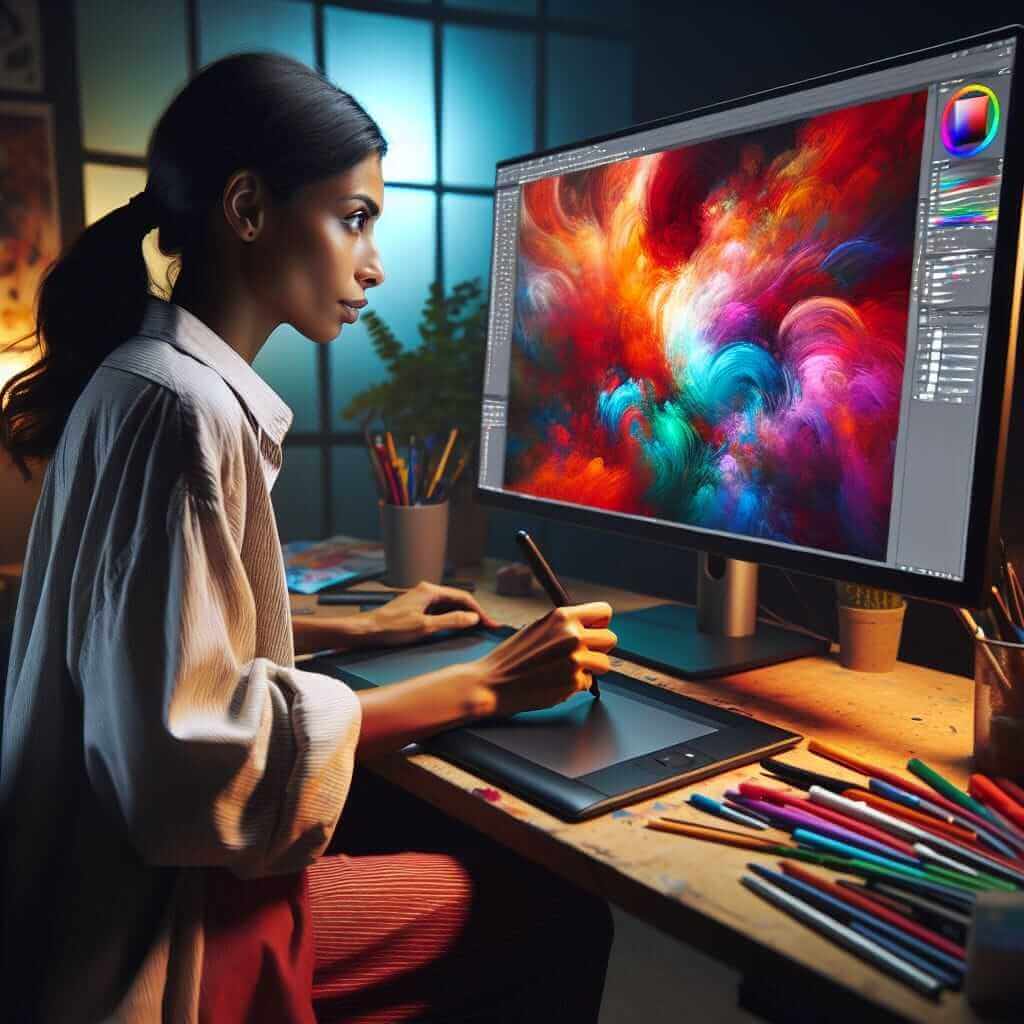The influence of digital technology on the arts is a rapidly emerging theme, gaining more relevance in contemporary dialogue as technology increasingly intersects with various art forms. This topic has made its appearance in IELTS Writing Task 2 exams and is likely to gain more traction in future editions of the test.
Nội dung bài viết
In past IELTS exams, topics revolving around technology’s impact on culture, lifestyle, and creativity have been common. Examples might include “The impact of technology on traditional cultures” and “Technology’s role in modern education.” Given the increasing ubiquity of digital platforms, it is plausible to anticipate more test prompts addressing digital technology’s influence on the arts specifically.
Below, you’ll find an analysis of prevalent exam questions, leading to a refined selection of a likely exam topic. This will be followed by a nuanced examination and a comprehensive essay sample to guide IELTS aspirants.
Common Exam Prompts
- “Discuss the impact of digital technology on traditional art forms.”
- “Digital technology is transforming the art world. Do you agree or disagree?”
- “How has digital technology influenced the way art is created and consumed?”
Selected Exam Prompt
“Digital technology is transforming the art world. Do you agree or disagree?”
Analysis of the Exam Prompt
To excel in addressing this prompt, it is imperative to analyze it from various angles. You are required to deliberate on whether you agree or disagree with the statement. This necessitates a balanced discussion considering both positive and negative implications of digital technology on the arts.
Key points to consider include:
- Creation: How has digital technology facilitated new methods for creating art?
- Consumption: Are there novel ways for audiences to consume and interact with art?
- Preservation: Has technology contributed positively to the preservation of art?
- Challenges: What are the drawbacks, such as the influence on traditional art forms?

Sample Essay
Digital technology is transforming the art world. Do you agree or disagree?
The advent of digital technology has indeed revolutionized various sectors of society, and the art world is no exception. I firmly agree with the statement that digital technology is transforming the art world, albeit with some reservations.
To begin with, digital technology has significantly broadened the horizons of artistic creation. Artists have access to sophisticated tools and software that allow them to experiment with new techniques and mediums that were unimaginable a few decades ago. For instance, digital painting software like Adobe Photoshop or Corel Painter furnishes artists with a myriad of brushes and effects, enabling them to create intricate artworks without the constraints of physical materials.
Moreover, the consumption of art has been dramatically altered by digital platforms. Online galleries and social media platforms like Instagram or DeviantArt offer artists unprecedented access to global audiences. This democratization of access has led to a more diverse and inclusive art world. Audiences can now engage with art from the comfort of their homes, participate in virtual exhibitions, and even purchase digital versions of artworks through platforms like NFTs (Non-Fungible Tokens).
Digital technology has also played a pivotal role in the preservation and restoration of art. High-resolution digital archives ensure that artwork can be preserved indefinitely, protecting it from physical degradation. Technologies such as 3D scanning and printing have opened new avenues for the restoration and reproduction of historical artworks, ensuring that cultural heritage is maintained for future generations.
However, it is crucial to acknowledge the challenges that digital technology poses to traditional art forms. The ease of reproducing digital artwork raises concerns about authenticity and originality. Furthermore, the shift towards digital media can sometimes overshadow traditional practices, leading to a decline in the appreciation for classical art forms.
In conclusion, while digital technology is undeniably transforming the art world, it is essential to strike a balance that respects and preserves traditional art forms. The benefits, such as enhanced creativity, broader audience reach, and improved preservation, significantly outweigh the challenges. Thus, I agree that digital technology is a transformative force in the art world, provided that it complements rather than substitutes traditional artistic practices.
Word count: 342 words
Key Considerations When Writing About This Topic
Vocabulary and Phrases:
- Broadened the horizons: Expanded the scope.
- Sophisticated tools: Advanced or complex devices and software.
- Democratization of access: Making something widely available.
- Artistic creation: The act of producing art.
- Technological preservation: Using technology to conserve something.
- Digital platforms: Online services or applications.
Grammar and Syntax Tips:
- Use complex sentences to show advanced grammar.
- Make sure to use transition words to enhance the flow of the essay.
- Use formal and semi-formal language appropriate for IELTS Writing Task 2.
Advanced Vocabulary to Remember
- Sophisticated (adj.) [səˈfɪstɪkeɪtɪd] – Advanced or complex.
- Intricate (adj.) [ˈɪntrɪkət] – Very detailed and complicated.
- Democratization (n.) [dɪˌmɒkrətaɪˈzeɪʃən] – The action of making something accessible to everyone.
- Preservation (n.) [ˌprɛzərˈveɪʃən] – The act of keeping something in its original state.
- Authenticity (n.) [ɔːˈθɛntɪsɪti] – The quality of being genuine.
- Restoration (n.) [ˌrɛstəˈreɪʃən] – The act of returning something to a former condition.
- Revolutionized (v.) [ˌrɛvəˈluːʃənaɪzd] – Changed something dramatically.
Conclusion
In summary, the impact of digital technology on the arts is profound and multifaceted. The key takeaways are the expansive means of creation, diverse methods of consumption, and enhanced preservation techniques facilitated by digital advances. The next likely IELTS prompts could include discussions around how digital technology interacts with culture or traditional industries. Being prepared for these will enhance your ability to articulate your thoughts effectively within the IELTS framework.